
ADF (Architects’ Datafile) is a leading monthly magazine and digital brand which is dedicated to bringing architects the broadest range of coverage on UK and international projects, plus opinion and insight from architects and manufacturers on key design and construction issues.
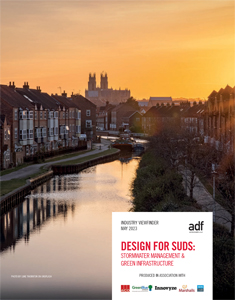
Design for SuDS - May 2023
The Government has announced that it will be mandatory to include Sustainable Drainage Systems (SuDS) in virtually all new housing developments in England from 2024. This finally implements Schedule 3 of the 2010 Flood and Water Management Act, which was adopted fully in Wales as far back as 2018. Increasing urbanisation and development for a growing population, combined with more intense weather patterns driven by climate change are causing our traditional sewer systems to be overwhelmed. Without a more effective, holistic water management approach, flooding events from surface water and sewers will cause more frequent and severe effects.
SuDS approaches encompass a range of established green infrastructure as well as ‘grey’ or man-made/engineered solutions to manage stormwater on sites and mitigate the impact on drainage. By its very nature, SuDS is about designing networks, and integrating systems together, both man-made and natural. We surveyed architects to discover their views on SuDS, as well as client awareness and architects’ role, when arguably they should be at the centre of the design process. Our research also looked at which of the various solutions currently available they were employing, and their views on including green infrastructure in developments for functionality, amenity and biodiversity.
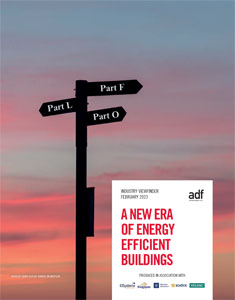
A New Era Of Energy Efficient Buildings - February 2023
The 2022 changes to Parts L and F of the Building Regulations for buildings (plus the introduction of Part O covering overheating for domestic buildings) bring some significant upgrades in specification. Part of the overall aim is to move towards the Future Homes Standard in 2025 (which will see a 75% reduction in carbon emissions), with the chief goal being lowering emissions towards the 2050 zero carbon legal target.
The interim changes mean that after June 2022, new buildings must produce as a minimum 31% less carbon compared with current Building Regulations. This is the first update to Part L in nearly a decade, with the initial emphasis put on building fabric, followed by low-carbon heating technologies. The changes to Part F (covering ventilation) are intended to ensure that as buildings become more energy efficient and air tight, air quality is not adversely affected. Similarly, Part O is introduced to ensure that consequent overheating is mitigated so is not a risk to occupants.
In this reader research, ADF is hoping to discover architects’ views on these important changes, and the practical solutions they are engaging in.
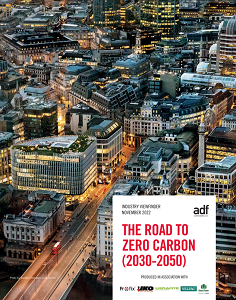
The Road to Zero Carbon - November 2022
According to the World Green Building Council, buildings are globally responsible for half of the world’s total CO2 emissions and resource consumption, and 36% of global energy consumption.
In 2019 RIBA joined the international Architects Declare movement to put practical steps in place to reduce emissions in projects, and issued its 2030 Climate Challenge in the run-up to COP26 in Glasgow, covering a range of targets across different sectors, and a focus on user wellbeing.
We canvassed our architect readership on their current opinions of progress on the zero carbon agenda, their views on the RIBA’s ongoing initiative, and their progress on zero carbon such as compliance with the Future Homes Standard 2025, which forms a key part of the Government’s plan to achieve its legally binding net zero 2050 target.
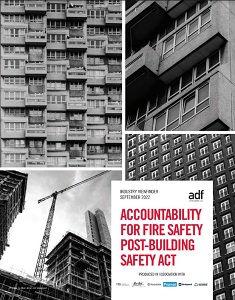
Fire Safety & Project Accountability - September 2022
The Grenfell Tower fire was the most devastating single event to occur in the UK’s built environment since World War 2. In its aftermath, various pledges and proposals have been put forward by the Government to try and redress failings identified across the industry. These include improvements in professional accountability for safety in the design and build of residential schemes.
The Hackitt Report found that accountability was far from clear in ‘higher risk’ residential schemes, when it came to overseeing specification. Also, the construction products testing and compliance regime, alongside the Building Regulations themselves, lacked robustness.
The Building Safety Act is a watershed bringing a clearer chain of responsibility, as well as tighter regulations, a Golden Thread of information, national construction products regulator, and a bigger role for architects in the form of the new Principal Designer.
We surveyed architects on their views of these fundamental changes to procurement, and how they saw the future of safety in projects. The findings included current challenges to accountability, the potential of the Building Safety Act to fix issues, ‘preserving the original design intent,’ and what’s needed from construction products testing, among many other crucial areas.
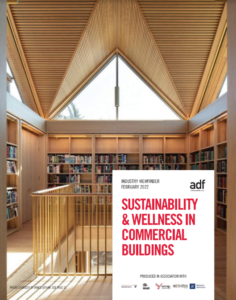
Sustainability and Wellness in Commercial Buildings - February 2022
The pandemic has left a question mark over the future of urban commercial environments. As a result, designing spaces which promote employee wellness as well as sustainability is now in the spotlight, to help clients bring staff back to workplaces and other commercial settings.
This white paper aims to find out architects' views on the factors and methods which are helping to drive designs for wellness and sustainability in the commercial sector.
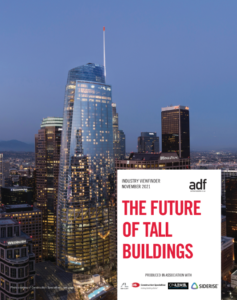
The Future of Tall Buildings - November 2021
Do tall buildings have a future, in the context of Covid and climate change?
Designers of tall buildings sit at a crossroads – will such structures continue to be a major focus for investment in the difficult context that developers now face? What is the realistic case for widespread urban tall building development post-Covid, in a world struggling to tackle climate change?
ADF and Edge Insight surveyed architects to find out their views on the future of tall buildings, homing in on some of the key factors which were facing architects looking at tall buildings design in the coming years.
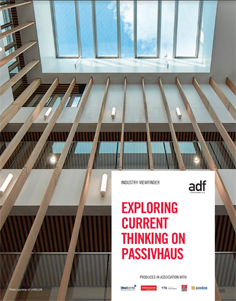
Exploring Current Thinking on Passivhaus - May 2021
Passivhaus is largely accepted by architects as an effective means of drastically reducing emissions in a range of building types, and therefore as an important weapon in the battle to reach the Government’s net zero target by 2050. But what about the wider supply chain, and clients? What accounts for the relatively poor takeup of Passivhaus in the UK compared with other countries, and what are the remaining stigmas and misconceptions around Passivhaus that need to be addressed?
Our survey of architects reveals designers’ real-world experiences of Passivhaus design, how it fits within the current procurement agenda, and what the remaining challenges are to the wider takeup hoped for by many.
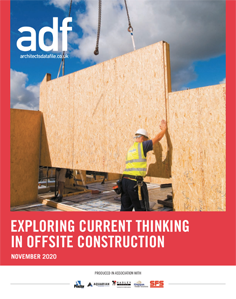
Exploring Current Thinking in Offsite Construction - November 2020
Offsite construction is hailed as the answer to the construction industry’s most pressing problems, including speed of delivery, the ‘performance gap’ in quality, and an increasing skills shortage. With the Government having set a goal of 300,000 new homes per year, fast and efficient offsite construction is not just a business benefit for clients, it has become a political imperative.
The survey of architects we conducted with Edge Insight demonstrated the design challenges posed by the rise of offsite construction, such as greater standardisation, but also the benefits for architects, from a more rigorous focus on build quality in projects, to enhanced collaboration. The views and experiences of design professionals in the sector captured in the White Paper provide illuminating findings for anyone involved in promoting or developing offsite construction.
To sign up to be part of our ADF newsletter and research mailing lists, please click here
netMAGmedia LTD
Please contact info@netmagmedia.co.uk for more information